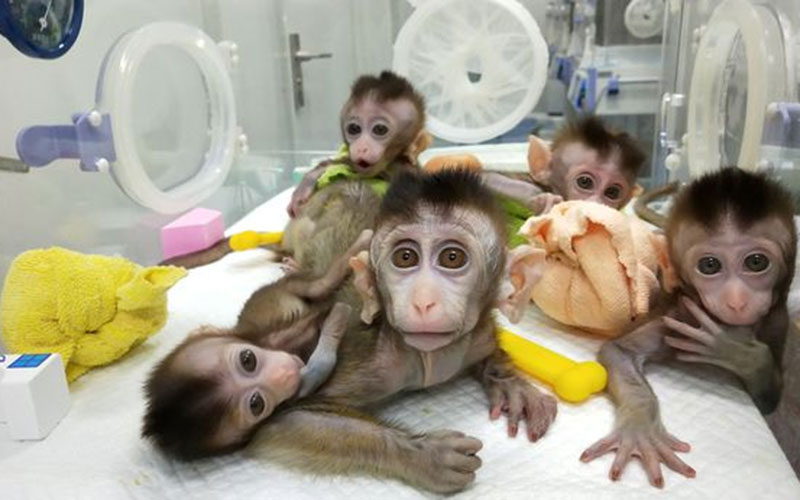
Scientists have successfully cloned five genetically-altered baby monkeys for very first time.
Using the same technique that produced Dolly the sheep, Chinese scientists are hailing the development as a major breakthrough.
They say it will eventually mean less live monkeys having to be used in lab experiments around the world and could give fresh insight into killer diseases such as cancer.
The ground-breaking quintet were born at the Institute of Neuroscience (ION) of the Chinese Academy of Sciences (CAS) in Shanghai.
Cells from a donor monkey were used to clone the five using the method of somatic cell nuclear transfer (SCNT).
That's the same method that last year generated Zhong Zhong and Hua Hua, the first two cloned monkeys, and Dolly the sheep back in 1996.
Chinese scientists say the advance, reported online by the journal National Science Review, shows that a population of "customised" gene-edited macaque monkeys with uniform genetic background will soon be available for biomedical research.
They said the cloned quintet showed signs of a wide-range of circadian disorder characteristics - including reduced sleep time, elevated night-time locomotive activities, dampened circadian cycling of blood hormones, increased anxiety and depression, as well as schizophrenia-like behaviour.
To create the monkey clones, Chinese researchers removed the nucleus from a monkey egg cell and replaced it with another nucleus from a fibroblast, a differentiated somatic (body) cell.
The reconstructed egg then developed into an embryo that carries the genes of the replacement nucleus.
The embryo was then transferred to the womb of a surrogate female monkey that later gave birth to the cloned monkey.
Previously, Zhong Zhong and Hua Hua were generated by using cells from an aborted fetus.
The five clones were created using cells from a young adult gene-edited donor monkey.
The researchers plan to continue improving the technique to increase the efficiency of cloning.
They are expecting more macaque clones carrying disease-causing gene mutations to be generated in the coming years.
But they said the Institute of Neuroscience follows strict international guidelines for animal research.
Co-author Professor Mu-ming Poo, who directs the Institute of Neuroscience and helped to supervise the project, said: "This work required coordinated efforts of many laboratories, and serves as a clear example of the efficient team work that is highly emphasised by CAS.
"This line of research will help to reduce the amount of macaque monkeys currently used in biomedical research around the world."
Since Dolly was cloned in Scotland back in 1996, more than 20 species of mammals have been cloned around the world - including cattle, cats, dogs, horses and rats.

 The Standard Group Plc is a multi-media organization with investments in media
platforms spanning newspaper print
operations, television, radio broadcasting, digital and online services. The
Standard Group is recognized as a
leading multi-media house in Kenya with a key influence in matters of national and
international interest.
The Standard Group Plc is a multi-media organization with investments in media
platforms spanning newspaper print
operations, television, radio broadcasting, digital and online services. The
Standard Group is recognized as a
leading multi-media house in Kenya with a key influence in matters of national and
international interest.
